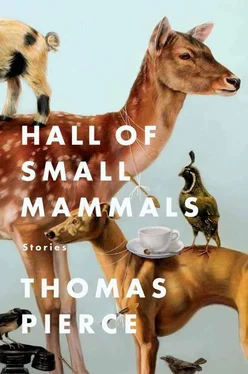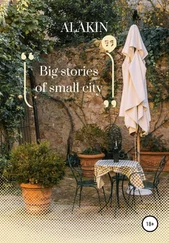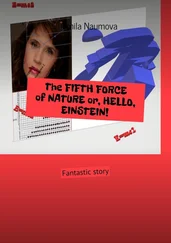Alan Gass only exists in her dream, she explains. He is an ophthalmologist, a tall man with bright blue eyes and a lightly bearded face. His favorite meal in the world is barbecue biscuits. He is allergic to shellfish. Years ago he played college football, but he’s put on a little weight since those days. On Saturdays he plays golf, but professes to hate what he calls clubhouse culture. He just likes the wind in his hair, the taste of a cold beer on the back nine. Claire has been married to him for almost a decade.
“Wow,” Walker says. “You have incredibly detailed dreams.”
“That’s what I’m trying to tell you. They’re super-realistic. Sometimes I dream that we’re just eating dinner together, kind of like this. We tell each other about our day. Or we don’t talk at all. We’ve known each other so long, silence is okay at this point, you know?”
Walker takes a bite of the potatoes. Claire hasn’t shut her laptop.
“You writing Alan an email over there?” he asks, and expects a full assault of noncommutative geometry, U-waves, big gravity. But when she turns the screen, he discovers that she’s looking at a website with pictures of celebrities eating messy sandwiches and picking out shampoo at the drugstore.
“So is Alan Gass better-looking than me?”
“Silly duck,” she says, a recurring joke about his outturned feet. She shuts the laptop and comes around the island. “Silly duck with big sexy glasses.” She plucks the glasses from his face. “Silly duck with snazzy shoes.” She taps his black shoes with her socked feet. “Silly duck with perfect duck lips.” She kisses him.
He stands and wraps his arms around her waist. A former high school volleyball star, Claire is a few inches taller than Walker, and even more so right now with her blond hair up in a high, messy bun. He doesn’t mind her height, but whenever they ride an escalator together, he claims the higher step to see what it’s like.
Admittedly, her dream is a strange one — so visceral, so coherent, so consistent — but he can see no reason why Alan Gass should come between them. After imagining a real affair, he feels somewhat relieved. It isn’t as though she is actually married and actually in love with an actual ophthalmologist. What counts is that the real Claire — the waking Claire, the part of her that matters — wants Walker and only Walker, and that is the case, is it not? She says that it is most definitely the case. She kisses him, tugs his hand to her cheek. She is relieved, she says, that he finally knows her secret, a secret she’s never told anyone, not even her parents. What a weight off her shoulders. Anything he wants to ask, he can ask. She will hide nothing from him.
• • •
Over the next few weeks, new details emerge. Claire’s dreams began when she was in high school. Walker can’t help wondering about the subtle differences between himself and Alan. Alan grew up Baptist in a small town and doesn’t drink. Walker grew up Episcopalian and drinks a glass of wine every night. Alan regularly wears suits. Walker prefers tight dark jeans and designer T-shirts. Alan volunteers at a free medical clinic. Walker can’t remember the last time he volunteered for anything.
But Walker tries not to dwell on Alan Gass.
Walker is the artistic director at a theater downtown. He met Claire there when she volunteered to help at the box office one semester. He was in that particular production. It was a German play about a ghost that wreaks havoc on a town by possessing prominent citizens and causing them to behave strangely. The town believes the ghost is that of a young woman who recently drowned herself because of a broken heart. The townspeople set out to find her body, thinking that will satisfy her, but it does not. The ghost responds by taking over the body of the town mayor and hurling the man off a tall building. To try and appease the ghost, the townspeople gang up on the man responsible for the woman’s broken heart. They tie weights around his ankles and drop him in the ocean. But that doesn’t solve the problem. This man also returns as a ghost looking for revenge. It was a gruesome play. Walker played the second ghost, the heartbreaker. Despite the white gunky makeup, Claire told him he was handsome.
Alan Gass is a ghost, and Walker knows you cannot fight ghosts. They are insidious. You can’t punch a ghost or write it a drunken email. You can only pretend the ghost is not there, hope it loses interest, evaporates, moves on, does whatever it is that ghosts do when they disappear completely.
• • •
They are sitting in the back row of a half-packed lecture hall on campus. Thanks to Claire’s advisor, their university is home to a conference dedicated entirely to the daisy. He is on the stage, pacing before a giant screen of exploding charts and graphics, a headset microphone curled around his ear, a scientific evangelist with brown curls and a bright, boyish face. Daisy Theory is under attack, he warns, from all sides.
Planets, hearts, even the parts of our brains responsible for dreams — everything in the universe is made of daisy particles. The daisies come together to form larger particles by interlocking in a chain formation. No one is entirely sure what holds the chains together, but Claire’s advisor imagines them like the daisy garlands that children wear as crowns.
In theory a daisy chain could pop in and out of existence, just like the individual daisy. In theory your entire body — since every atom in it is nothing but a complex collection of daisies — could also pop in and out of existence.
“Isn’t that amazing?” he asks the crowd.
On the top of the conference program, Walker draws two flowers and gives them arms and legs and hands to hold. The figures are like cave paintings. Me, man. You, woman. This, love.
He writes, Want to be in my chain gang? and slides the program across his knee to Claire. She smiles and grabs the pen. She doodles a penis on one figure and breasts on the other. They have to avoid eye contact or else they’ll lose it.
After the lecture, a handful of people gather in a small white room with mahogany tables, where they quietly sip red wine in groups of two and three. Claire’s advisor meanders over with a barely suppressed grin on his face.
“And?”
“Brilliant,” Claire says.
Within only a few seconds, the two of them are lost in daisy revelry and Walker can only nod and smile. “We’re stretching math to the breaking point,” her advisor says, turning to Walker. “It’s almost unmath. One and one aren’t two, but onetyone.” Her advisor has his hand on Claire’s elbow, cupping it, as if propping it up. If he lets it go, her elbow might go crashing to the floor like a satellite from space. But when he walks away again, at last, Walker is pleased that her elbow stays put at her side.
“He’s got a thing for you,” Walker says.
“This again?”
“Not that I can blame him.”
“Even if he did,” she says, “it’s not like I’ve got one for him.”
On the way home, because of construction on the bridge, they have to take a detour through another neighborhood. Claire knows these streets better than him but, against her advisement, he takes a left turn. The road dead-ends in front of an old farmhouse, its giant gray shutters flapping in the wind like moth wings. It is early summer, perfectly warm, and they have the car windows rolled down. To turn around he backs their Jeep into the driveway, the brakes squealing. Another car has turned onto the street behind them. They pass it on their way back to the main road, a pearly gray Lexus. The driver’s face is obscured by lights across the glass, but Walker can see that he has a military haircut, the gray lines sharp around his ears, the seat belt tight against a white oxford shirt. But his features are blurred. He could be anyone. Even Alan.
Читать дальше












